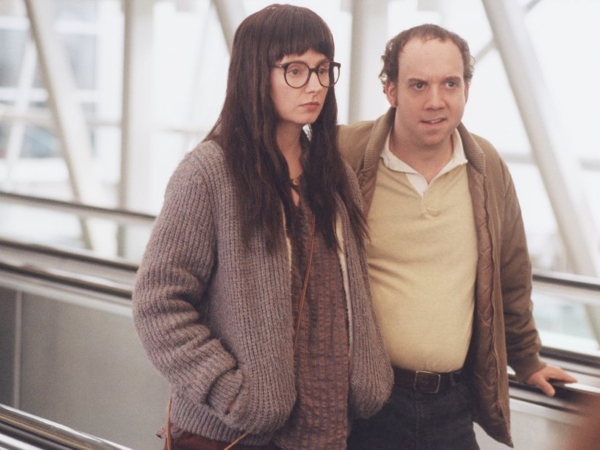Movie review by Greg Carlson
Professional V.A. hospital file clerk and underground comics legend Harvey Pekar is the subject of “American Splendor,” a phenomenal film that recounts his life story after the fashion of Pekar’s own autobiographical comic book series. Directors Shari Springer Berman and Robert Pulcini trust in Pekar’s potent personality enough to blend fiction with fact, and then double it all back on itself. Pekar appears in the movie as himself, but is also brilliantly played by Paul Giamatti. At other times, pen and ink animations of Pekar take over the screen. The movie smartly indulges these doppelgangers because they are a perfect reflection of the fractured way in which Pekar is illustrated in the comics.
A world-class ranter and curmudgeon, Pekar began documenting the mundane, everyday struggles and humiliations of his minimum-wage Cleveland existence after meeting fellow record collector R. Crumb at a garage sale. Unable to draw more than a stick figure, Pekar enlisted Crumb, and eventually a number of other illustrators, to visualize his world of plebeian despair. “American Splendor” reminds viewers of Terry Zwigoff’s excellent documentary “Crumb,” and actor James Urbaniak nails both Crumb’s old-fashioned sartorial sensibility and his awkward vocal mannerisms.
“American Splendor” finds its odd romantic center with the appearance of Pekar’s soul mate, Joyce Brabner (wonderfully channeled by Hope Davis under oversized glasses and severe black bangs). The movie, like Pekar’s stories and the L.A. play that was produced about the courtship, highlights the most perversely enjoyable aspects of the unlikely coupling. Upon arriving from Delaware following a pen-pal flirtation, Joyce is immediately informed by Harvey that he has had a vasectomy. As soon as the pair arrives at Pekar’s filthy apartment, Joyce vomits up the terrible “yuppie food” she had consumed at a cruddy restaurant Harvey had picked out. Naturally, she proposes, and a week later they are getting married.
The filmmakers perfectly regulate the weird cycle of celebrity and obscurity that has defined Pekar for decades. During the 1980s, Pekar appeared frequently as a guest on “Late Night with David Letterman,” fielding the host’s barbs in exchange for publicity for his comics. Real footage of Pekar sparring with Letterman is intercut with Giamatti and a mostly unconvincing Letterman soundalike, but the entire “Late Night” saga, which ended with bitterness and acrimony, provides one of the most fascinating sequences within the movie.
The irony of “American Splendor” is that it celebrates and venerates the achievements of a person who has carefully constructed his miserable, underdog persona. At one point, the real Brabner admonishes Pekar’s sourpuss worldview, but a twinkle in Harvey’s eye gives away at least a small part of the game: Pekar is on some level happy with his downheartedness. His seemingly cheerless life has been marked by some amazing accomplishments: winning awards, beating cancer, raising a child, steady authorship, etc. Maybe the secret is that Pekar’s dejection is reassuring when it is juxtaposed against the wistful image of the man at his retirement party, surrounded by friends, enjoying a piece of cake and a hug from his loved ones.
